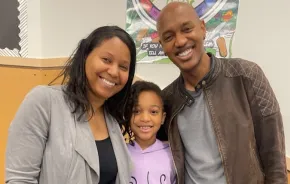I am one of those people who used to cringe at the sight of misspellings and poor grammar. Reading and spelling are second nature to me. My parents used to joke that I could read before I could talk and nicknamed me "walking dictionary." I have picture-perfect handwriting. I’ve lived with straight A’s and a life of ease in the academic world. I wanted a bachelor’s degree, so I simply got one.
And yet I married a man who is profoundly dyslexic. He spent his school days in the resource room. He graduated from high school at a fourth-grade reading level. If you look a little deeper, it makes perfect sense: 35% of entrepreneurs have dyslexic traits. They become very skilled at finding ways to make things happen and at seeing the bigger picture. They’re problem-solvers. I am the piece of him that he always felt was missing. To me, my husband is the compassionate, brilliant, creative, hard-working man I knew I could count on to raise my dream family with.

The first time I heard my husband, Burt, read, I was astounded. How could this funny, intelligent, witty guy read so laboriously (Did I mention how handsome he is?). Then, I saw his spelling, I would have pitied him if he allowed for that sort of thing.
But Burt has one thing that many dyslexics never get the opportunity to develop: confidence. His parents tried a million ways to help him read — failing miserably — but in the end focused on helping him feel good about himself. Confidence was really what he needed the most. The shame associated with dyslexia has been described as the deepest, darkest, worst kind of shame that you can imagine. Somehow, for the most part, Burt managed to escape that. He used humor to brush off the fact that he was a terrible reader and speller. He continues to go by the nickname "Trub," ("Burt" backwards). Many dyslexics get wrongfully labeled as "lazy." I know firsthand that nothing could be further from the truth. Watching my husband read, I can see how much harder it is for him to do something that comes so easily for me and many others.
Burt and I have a 6 ½ year old son, Walter. When Walter was 5 ½, we learned that he had dyslexia, too. My brilliant son was having the hardest time learning how to count. At the time, I would have called it a near inability to count.
Then I discovered it wasn’t just counting. Any sequence was a very difficult task for him. He knew every song imaginable, except his ABCs. Walter was also having trouble decoding.
After four years of preschool, he had managed to learn his letter and sound associations, but when I would ask him to “sound out” words, usually I got a puzzled look or a blank stare. I couldn’t figure it out. I had dutifully read to my son every day of his life. He wanted to learn to read; he insisted on learning to read. I was lost. I turned to an online group of homeschooling mothers for advice. They gave me all sorts of guidance. One of them sent me a private message. She suggested that I take a look at the signs and symptoms of dyslexia.
This came as a pretty big shock. I mean, certainly I would know if my son had dyslexia. My husband has it. Walter never transposed his letters. That was the day that I discovered that I knew absolutely nothing about my husband’s learning differences. We’d been married for 13 years. Actually, he knew very little about dyslexia, himself.
 As you might imagine, I now look at misspellings and poor grammar from a different perspective. The past year has been a year of discovery for all of us. It’s been a year full of celebrations and coming to terms. It’s been a year of school-switching, some tears, new friends, and one-on-one tutoring.
As you might imagine, I now look at misspellings and poor grammar from a different perspective. The past year has been a year of discovery for all of us. It’s been a year full of celebrations and coming to terms. It’s been a year of school-switching, some tears, new friends, and one-on-one tutoring.
I imagined that school would be different for my children than it was for my husband, that in 30 years, things must have improved. But the reality is that very little has changed since Burt went to school. Schools are not any better equipped to deal with reading failure than they were back then.
Dyslexia affects 15-20% of the population, and less than one third of those with dyslexia receive proper intervention in school. Dyslexia ranges anywhere from mild to moderate to severe. It is as widely misunderstood by most teachers, as it is by most parents. I tutor my son at school four times a week in 30-minute increments. I am grateful for the opportunity and ability to do this. This is not possible for the majority of parents. In the evenings, I connect with other local parents of struggling readers. I answer questions and offer resources. I am part of the national Decoding Dyslexia movement that originated in New Jersey. We visit with our government officials and our school boards in order to raise dyslexia awareness, empower families and inform policymakers on best practices to identify, remediate and support students with dyslexia in our nation’s schools. Decoding Dyslexia has organizations in 46 states. My story is just one of many. Dyslexia will display differently for different children. If your child is a struggling reader, there is hope. For more information or to contact a representative in your state, visit Decoding Dyslexia.











